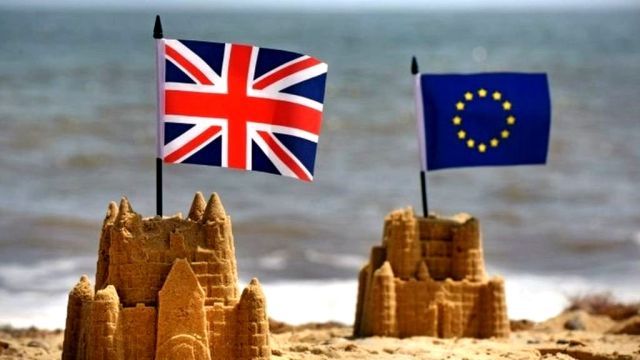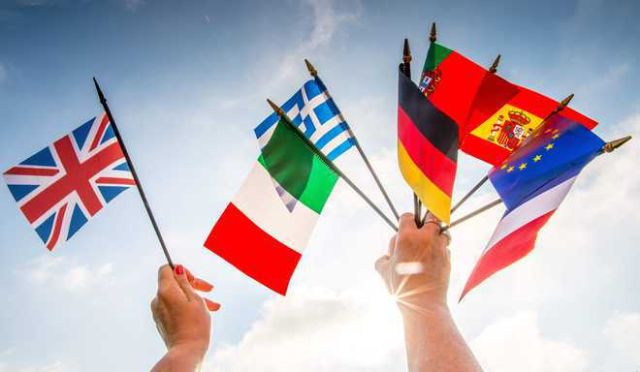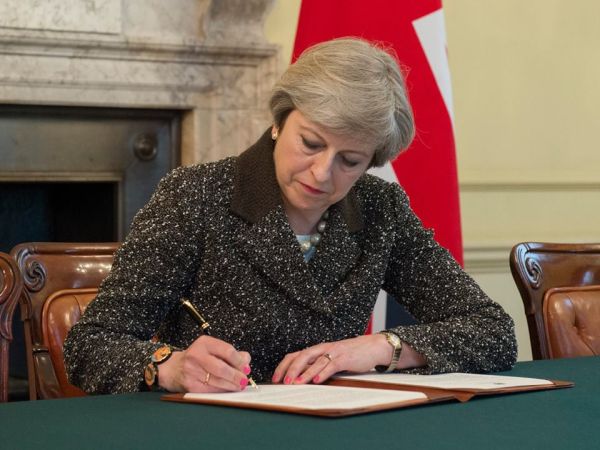
by admin | May 25, 2021 | World

Theresa May
London : UK Prime Minister Theresa May is likely to postpone Tuesday’s key parliamentary vote on her Brexit plan, the media reported on Monday, amid predictions that she would suffer a “significant” defeat that could threaten to end her premiership and topple the government.
British media reports cited government sources as saying that May would inform MPs in the House of Commons about the delay in a statement later in the day. However, Downing Street insisted that the vote would go ahead.
The pound fell sharply following the reports, shedding 0.5 per cent versus the US dollar to stand at $1.26. Against the euro, the pound was 0.8 per cent down at 1.10 euros, the BBC reported.
May’s Commons address will be followed by a statement from the leader of the House, Andrea Leadsom. Later, Brexit Secretary Stephen Barclay will also make a statement on Article 50 — the legal mechanism taking the UK out of the EU on March 29.
According to the Guardian, a vote could take place next week or even be delayed till early January. The ultimate deadline for the vote is January 21.
The deal has been agreed with the EU, but it needs to be backed by the UK Parliament if it is to become law ahead of the UK’s departure.
The news followed the European Court of Justice’s ruling earlier in the day that the UK could cancel Brexit without the permission of the other 27 bloc members.
The court in a statement said: “When a member state has notified the European Council of its intention to withdraw from the EU, as the UK has done, that member state is free to revoke unilaterally that notification.”
“That possibility exists for as long as a withdrawal agreement concluded between the EU and that member state has not entered into force or, if no such agreement has been concluded, for as the two-year period from the date of the notification of the intention to withdraw from the EU, and any possible extension, has not expired,” stated the ruling tweeted by the court.
The judges ruled that this could be done without altering the terms of Britain’s membership. The court rejected arguments from both the UK government and the European Commission that Article 50, the two-year-long process that triggers a member state’s departure from the EU, could not be revoked unilaterally.
The case was brought to the European Court of Justice by a cross-party group of Scottish lawmakers.
The court ruling matched legal advice given to the court last week by its Advocate General Manuel Campos Sánchez-Bordona, who said as a sovereign country Britain could reverse its decision even at this stage.
This legal decision was significant because it meant Britain can prevent a no-deal Brexit from happening if it wanted, even if May’s deal was voted down by MPs.
May, whose Conservative Party executive wields a minority in the Commons, enacted Article 50 on March 29, 2017, meaning the UK is due to withdraw from the EU on March 29, 2019, with or without a deal.
She is due to attend a meeting of European leaders on Saturday, at which the parliamentary impasse over Brexit is likely to be top of the agenda.
European Commission head Jean-Claude Juncker on Monday ruled out the possibility of further negotiations with London, saying that the draft deal has already been unanimously adopted by member states.
—IANS

by admin | May 25, 2021 | World

Theresa May
London : UK ministers were set to battle on Wednesday in an attempt to win over rebel MPs on Prime Minister Theresa May’s Brexit deal, a day after the government suffered three parliamentary defeats on key votes.
The start of a five-day debate on May’s deal was delayed by several hours on Tuesday as MPs, in a first defeat for the Prime Minister, passed a historic motion finding the government in contempt of Parliament for failing to publish in full the legal advice on Brexit, the BBC reported.
A crunch vote on May’s Brexit deal is scheduled to take place next week while her ministers will plough on with attempts to win over MPs on Wednesday, with eight hours of debate on the security and immigration aspects of the withdrawal agreement.
The shadow Brexit secretary, Keir Starmer, called the defeats a “badge of shame” for the government.
“By treating Parliament with contempt, the government has proved it has lost its majority and the respect of the house. The Prime Minister can’t keep pushing Parliament away or avoiding responsible scrutiny,” he said.
In a second defeat, the government lost a bid to have the legal advice issue dealt with separately by the Privileges Committee of MPs.
With May still waiting to open the formal debate, MPs then inflicted a third defeat, passing a cross-party amendment tabled by MPs including Dominic Grieve aimed at strengthening the hand of Parliament if the deal gets voted down.
Supporters of a second referendum on May’s deal cheered the move, which they said would allow them to demonstrate Parliament’s support for alternatives to the Prime Minister’s approach.
Former Tory chief whip Mark Harper told the BBC he expected May to lose the crunch vote on her Brexit deal scheduled to take place on December 11 where MPs will decide whether to reject or accept the agreement.
Harper, who backed Remain in the referendum told the Daily Telegraph he would vote against the withdrawal agreement and predicted the deal would be rejected by 80 of his party colleagues.
The deal has been endorsed by EU leaders but must also be backed by the UK Parliament if it is to come into force.
The UK is due to leave the EU on March 29, 2019. Ministers say that if MPs reject their deal they increase the chances of Britain leaving without a deal, or not leaving the EU at all.
Harper urged May to renegotiate the deal, insisting the current plan would leave the UK worse off.
Meanwhile, May was expected to continue trying to convince small groups of her MPs to back the plan in private meetings.
“I promise you today that this is the very best deal for the British people and I ask you to back it in the best interest of our constituents and our country,” she told the Commons on Tuesday.
—IANS

by admin | May 25, 2021 | Opinions
 By Amit Kapoor,
By Amit Kapoor,
Divorces are always messy, but none have so much at stake as the separation of Britain from the European Union (EU).
Almost two-and-a-half years after 52 percent of Britons who voted in favour of a Brexit, Prime Minister Theresa May has managed to draft a deal that aims to withdraw the country from the EU before the cut-off date of March 29, 2019. Even though the deal has been begrudgingly passed by May’s cabinet, there are virtually no supporters for it on either side of the Brexit debate.
Britain has four ways to go about Brexit: A hard Brexit; a softer Brexit; a sketchy middle ground where May has ended up with the current deal; or simply, no deal, where Britain drops out of the EU after the cut-off date and ends up reverting to standard international trading rules. The last case is simply catastrophic where tariff and border checks would immediately be put in place and movement of people would become restricted.
A hard Brexit would also imply the UK making a definitive split from the EU, ending its membership in the single market, customs unions and the court of justice. This would give UK more freedom to set its own rules and regulations. A softer Brexit would imply lesser change from the status quo. A really soft Brexit could even involve the possibility of UK staying on in the single market or customs union.
The major complication in coming to an agreement arises from the case of Northern Ireland. The region, which is a part of the UK, could spiral into sectarian violence if it is separated from Ireland through physical barriers or checkpoints or, in other words, a hard border, as it would limit the flow of people and goods between the two regions.
The Ireland-Northern Ireland border has been open since 1998 after the Good Friday Agreement was ratified to bring peace to the region after decades of violence. However, a clean Brexit would require imposition of hard borders between the UK and the EU, which implies a hard border between Northern Ireland and Ireland as the latter is a part of EU. Such a scenario would eventually end in rising tensions, which everyone wants to avoid at all costs.
So, the Brexit dilemma lies in coming to an agreement that retains the integrity of the UK and the Good Friday Agreement. May’s deal tries to circumvent this by letting the UK stay within the EU’s customs area, which would imply staying in the EU single market and avoiding hard borders, while allowing UK to make independent trade deals with other countries. As such a deal would not include the imposition of any hard borders, the free flow of goods and people between Ireland and Northern Ireland would remain unchanged.
However, it is obvious why such a deal has appeased no one. The pro-Brexit camp feels that the terms of the draft deal violate the very meaning of Brexit, which was to let UK regain control of its own policies. May’s plan forfeits the influential role that the UK played in the EU while making it a mere rule-taker of the union. The ability to negotiate its own trade deals would recover only a fraction of the cost of Brexit by the government’s own calculations.
Meanwhile, for the Remain camp, the deal is far worse than the status quo for almost similar reasons. The two factions have unanimously united over their dislike for the draft deal.
Such reactions should have been expected. It was evident that no one would have been satisfied with the final outcome of such a divisive issue. The very fact that no party is satisfied makes it the least unreasonable compromise. But at this stage, there is a strong case for a referendum on the exit deal. The Brexit votes were won by a very narrow margin at a time when the terms and the cost of the move were not known to the voters. There was a clear democratic deficit, which needs to be filled.
The idea of Brexit that was sold to the masses at the time was that the country would somehow manage to seize control of its policies and achieve higher prosperity in the process without incurring any significant economic costs for itself. The deal that has been chalked out in these two-plus years is nothing close to these promises of the “Leave” campaign. It is highly likely that the deal will not pass through the British Parliament itself but now that the extent of economic pain and long-term repercussions of Brexit are becoming clearer, it is vital to get a sense of the public opinion about the matter before the only option of a no-deal remains.
The latter outcome would be catastrophic for the both the British and the world economy; a prospect that is completely avoidable.
(Amit Kapoor is chair, Institute for Competitiveness. The views expressed are personal. He can be contacted at amit.kapoor@competitiveness.in and tweets @kautiliya. Chirag Yadav, senior researcher, Institute for Competitiveness, has contributed to the article)
—IANS

by admin | May 25, 2021 | Business Summit, Events, Social Round-up, World
 Brussels : The leaders of the 27 countries that will remain in the European Union (EU) after Britain’s withdrawal called off an extraordinary summit on the Brexit in November due to insufficient progress to organise the meeting.
Brussels : The leaders of the 27 countries that will remain in the European Union (EU) after Britain’s withdrawal called off an extraordinary summit on the Brexit in November due to insufficient progress to organise the meeting.
“For now, the 27 are not planning to organise an extraordinary summit on Brexit in November,” European sources said on Wednesday.
Those same sources said that the leaders stand “ready” to convene a European Council, “if and when” the EU’s chief negotiator, Michel Barnier, reports that “decisive progress” has been achieved, reports Efe news.
The Heads of State and Government of the 27 met in Brussels on Wednesday to hear a statement delivered by the British Prime Minister Theresa May, on the Brexit and then, without the UK, discussed how to proceed with the negotiations less than six months away from the planned British exit.
Brussels had planned to close the withdrawal agreement with the British government in October so the the European Parliament and Westminster parliament could ratify it before March 29, when Brexit will materialize.
During the informal summit in Salzburg in September, the President of the European Council, Donald Tusk, already said that the October meeting would be “the moment of truth” for the negotiations and that by then he hoped “the maximum progress and result”.
“If we feel that we will be able to finalise and formalise our agreement in November, I will convene this extraordinary meeting”, which would take place on November 17 and 18, the Polish politician said last month.
However, on October 14 London and Brussels failed to close an agreement and decided to stop negotiations
This Wednesday, the Heads of State and Government of the 27 reaffirmed their “total confidence” in the community negotiator, Michel Barnier, and their determination to remain united.
—IANS

by admin | May 25, 2021 | World

British Prime Minister Theresa May
London : The British government on Thursday published the long-awaited white paper on Brexit seeking to create a free trade area with the EU. Prime Minister Theresa May said it delivers on the Brexit vote.
The 98-page document, titled “The Future Relationship between the UK and the EU”, was published amid chaotic scenes in the House of Commons. It spelled out that workers from the other 27 EU member states will be able to travel to Britain visa-free to take up temporary employment, the Guardian reported.
It also stated that businesses that provide services will be able to move their talented people to and from Europe and Britain. Media reports in London said the white paper had been amended to soften the restrictions on Europeans coming to Britain after Brexit.
Dominic Raab, newly-appointed Brexit Secretary after the shock resignation of David Davis, gave details of the proposals to MPs in the Commons. The release of the document sparked chaotic scenes when it became apparent that copies of the paper were not immediately available to MPs.
He described the proposals as a “principled and practical Brexit”, describing the white paper as “the most significant Brexit publication” since the referendum in 2016.
Asked if there was a possibility of no-deal being struck between the EU and Britain, Raab said every eventuality was being planned for, but his aim was to see a future trade deal with Brussels.
May said the document “delivers on the Brexit people voted for”. But, pro-Brexit politicians vowed to table amendments saying May’s plan did not amount to Britain fully leaving the EU. It will see Britain leaving the European single market and the customs union.
The Department for Exiting the EU said the document proposed “a free trade area for goods that ensured continued frictionless access at the border, protected jobs and livelihoods and ensured Britain and EU meet their shared commitments to Northern Ireland and Ireland”.
Raab said the white paper outlined a vision that respects the result of the referendum and delivers a principled and practical Brexit. “It would maintain frictionless trade in goods between the UK and the EU through a new free trade area, responding to the needs of business,” he said.
Tory Brexiteer Jacob Rees-Mogg said it was a “bad deal for Britain”.
EU’s chief negotiator Michel Barnier said he would analyse them (proposals) with the European Parliament and member states and was “looking forward” to negotiations with the UK next week.
—IANS




